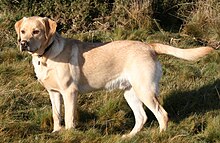
Back Labrador Retriever Afrikaans ላብራዶር Amharic لابرادور ريتريفر Arabic لابراضور ريتريڤر ARY Labrador retriver Azerbaijani Лабрадор ретривър Bulgarian Labrador retriever Catalan لابرادۆر ڕیتریڤر CKB Labradorský retrívr Czech Лабрадор-ретривер CV
| Labrador Retriever | |||||||||||||||||||||||||
|---|---|---|---|---|---|---|---|---|---|---|---|---|---|---|---|---|---|---|---|---|---|---|---|---|---|
 Adult male | |||||||||||||||||||||||||
| Other names | Labrador | ||||||||||||||||||||||||
| Common nicknames | Lab | ||||||||||||||||||||||||
| Origin | United Kingdom | ||||||||||||||||||||||||
| Foundation stock | St. John's water dog | ||||||||||||||||||||||||
| |||||||||||||||||||||||||
| |||||||||||||||||||||||||
| Dog (domestic dog) | |||||||||||||||||||||||||
The Labrador Retriever or simply Labrador is a British breed of retriever gun dog. It was developed in the United Kingdom from St. John's water dogs imported from the colony of Newfoundland (now a province of Canada), and was named after the Labrador region of that colony. It is among the most commonly kept dogs in several countries, particularly in the European world.
The Labrador is friendly, energetic, and playful.[2] It was bred as a sporting and hunting dog but is widely kept as a companion dog. It may also be trained as a guide or assistance dog, or for rescue or therapy work.[3]
In the 1830s, the 10th Earl of Home and his nephews, the 5th Duke of Buccleuch and Lord John Scott,[4] imported progenitors of the breed from Newfoundland to Europe for use as gun dogs. Another early advocate of these Newfoundland fishing dogs was the 2nd Earl of Malmesbury, who bred them for their expertise in waterfowling.[4]
During the 1880s, the 3rd Earl of Malmesbury, the 6th Duke of Buccleuch, and the 12th Earl of Home collaborated to develop and establish the Labrador Retriever breed. The dogs Buccleuch Avon and Buccleuch Ned, given by Malmesbury to Buccleuch, were mated with bitches carrying blood from those originally imported by the 5th Duke and the 10th Earl of Home. The offspring are the ancestors of all modern Labradors.[5]
- ^ Cite error: The named reference
McMillan2024was invoked but never defined (see the help page). - ^ Cite error: The named reference
akcwas invoked but never defined (see the help page). - ^ "AKC Dog Registration Statistics". Akc.org. 4 April 2012. Archived from the original on 11 May 2012. Retrieved 9 April 2012.
- ^ a b Article written for The Field, 30 May 1896, 'Labrador Dogs', by John S Kerss
- ^ The Labrador Retriever Club, Inc. (1995). "The Labrador Dog". In Ziessow, Dr. Bernard W. (ed.). The Official Book of the Labrador Retriever (1st ed.). 1 TFH Plaza, Third & Union Aves, Neptune, NJ 07753, USA: TFH Publications, Inc. pp. 24–25. ISBN 9780793801886. Retrieved 2 September 2023.
{{cite book}}: CS1 maint: location (link)